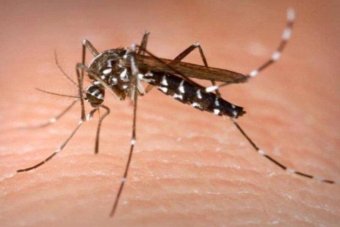A spike in the number of dengue fever cases in South Australia has prompted a warning from the State Government urging travellers to protect themselves against the disease.
Health Minister Jack Snelling said there had been 58 cases of dengue fever recorded so far this year compared to 41 cases a year ago.
Three-quarters of those cases contracted the disease while holidaying in Indonesia, particularly while in Bali.
The symptoms of dengue fever can occur suddenly and include fever, intense headache and pain behind the eyes, muscle and joint pain, loss of appetite, vomiting and diarrhoea, a skin rash and bleeding from the nose or gums.
Ways to avoid mosquito bites
- Wear loose and light-coloured clothing
- Wear long sleeves, trousers and socks
- Use insect repellents containing DEET or picaridin
- Re-apply insect repellent every four hours
- Use flyscreens and mosquito nets in affected regions
- Treat clothing with permethrin insecticide
While the disease is not usually fatal, there can be serious complications such as dengue haemorrhagic fever or dengue shock syndrome.
Dengue fever is spread via mosquitoes that are infected with the disease but cannot be spread from person to person.
“Over the winter months many South Australians decide to escape the cold and holiday in nearby tropical destinations,” Mr Snelling said.
“What many of these people don’t realise is that dengue fever, a disease spread by mosquitoes, is present in a number of our neighbouring countries.”
Mr Snelling said South Australia had recorded a steady rise in the number of cases over the past five years, with only 23 people diagnosed with dengue fever in 2010.
There is no vaccination to protect travellers against dengue fever.
But SA Health communicable disease control branch director Dr Ann Koehler said there were other ways travellers could protect themselves.
“The most reliable way to make sure you don’t catch a mosquito-borne disease is to wear a mosquito repellent containing DEET or Picaridin which will help avoid being bitten by a mosquito,” she said.
“There are other measures you can take to avoid being bitten, including wearing light-coloured, long-sleeved clothes when you’re outdoors, avoiding wearing perfume or cologne as some can attract mosquitoes, and using a mosquito net at night time.”

